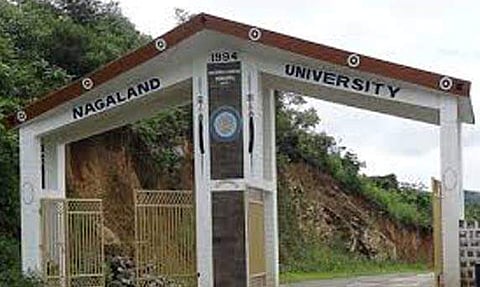

While the 13-point roster system is believed to be a major obstacle for reservation-based teacher appointment, teachers in the North-Eastern states like Nagaland believe that they have got the rawest end of the deal — because nearly 90% of the state fall under the Scheduled Tribe category.
Joining the teachers' unions in all the major central universities to protest the 13-point roster system, all four campuses of the Nagaland University remained closed on Wednesday. While the new roster system is being criticised by academics all around the country as an attempt to kill reservation in faculty appointment, its ramifications will be much larger in Nagaland, compared to any other Indian state.
According to the 2011 census, 86 per cent of the Nagaland population fall in the Scheduled Tribes category. So, the implementation of a 13-point roster in faculty recruitment will essentially mean that it may be years before a faculty position falls vacant for an ST category teacher, whereas for a General Category candidate, who form less than 14 per cent of the state's population, the chances are much greater.
"In most of the central universities, the SC, ST, OBC seats are very less. ST seats are nearly non-existent," says Rajib Ray, the Delhi University Teachers' Association President, explaining the roster. The new roster, that considers each department as a unit will have its fourth, eighth and twelfth seats reserved for OBC candidates, the seventh seat for an SC candidate and the 14th seat for an ST candidate. This works best, only if a department has 14 or more seats. "Most of the departments, especially in smaller universities, will not have a 14-member strength to ensure that enough seats are reserved for the SC, ST and OBC category. If the strength is less than 14, you miss out on the ST, you miss out SC if it is less than 7 and OBC if the strength is less than 4," Ray explains. In any case, candidates from the ST category will be hit the worst.
This view is echoed in Nagaland quite emphatically. "We're very unhappy with the current system. We're backing the Federation of Central University Teachers Associations (FEDCUTA)'s demand. The current roster system will consider each department of the university as a separate unit. So, in that case, after how many years will a reserved post come up? This is a very serious issue, especially for the large tribal population in the state," says Rosemary Dzuvichu, the Nagaland University Teachers Association President. "The tribals will have no chances at all here. The quota seats are also not advertised properly here. The government is speaking for the higher castes and aren't looking at the lower castes and classes," she adds.
She also says that the university started implementing the reservations for faculty appointment only seven years ago. "For many years, reservations haven't been implemented in the university. 15 years ago, when the MHRD and UGC questioned the university on its reservation data, the then Vice-Chancellor adjusted it by pushing the faculty from ST category, who were placed in the general category to the ST quota. They did not bother to appoint new faculty in the quota. Years down the line, the anomalies of that still exist. We're also looking for that to be revoked," says Dzuvichu, who is looking forward to the next cabinet meeting, where the HRD Minister Prakash Javadekar had promised a solution to the issue.
Meet the three diffabled youngsters who are itching to make India proud at the Special Olympics
Six out of ten young men in Hyderabad are addicted to porn, finds study
From eve-teasing to cyberbullying, how Vijayawada's Vasavya Mahila Mandali can help
13 point roster debate: Javadekar assures action within two days
